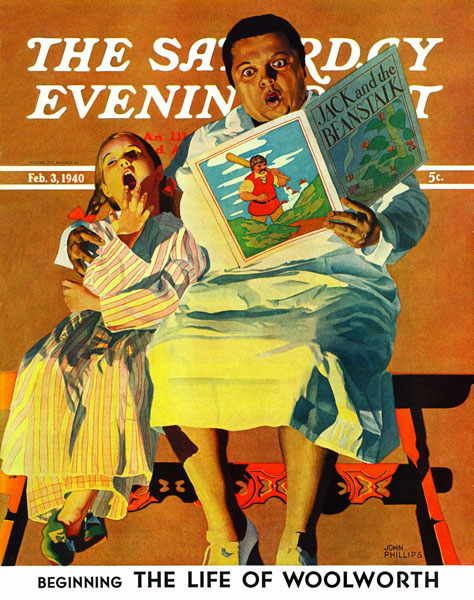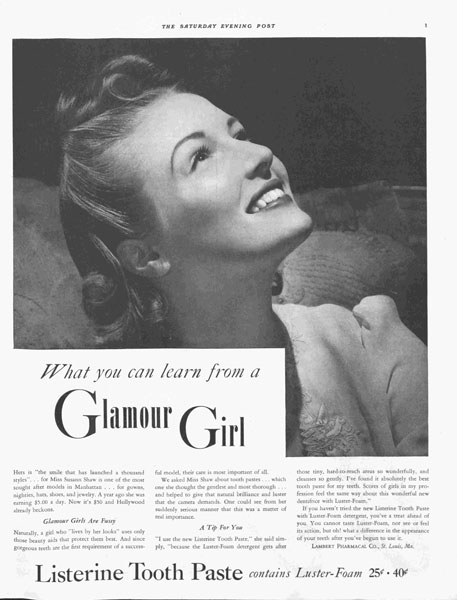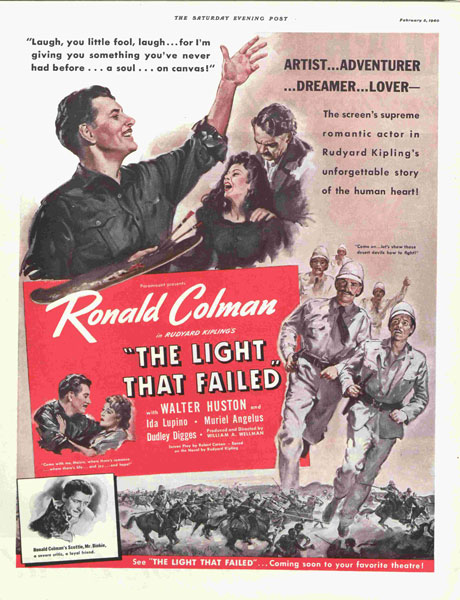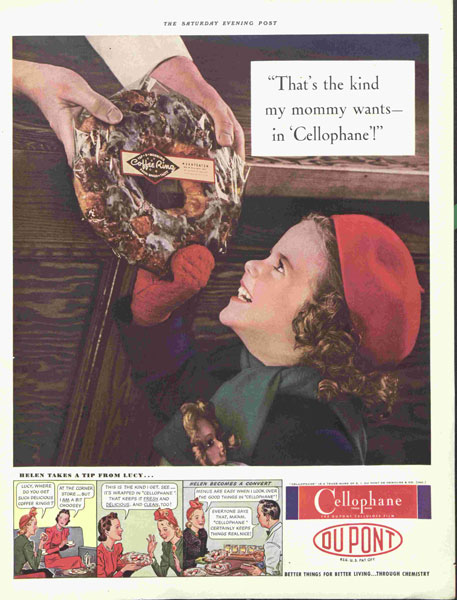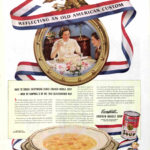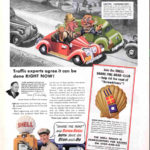The Propaganda Wars
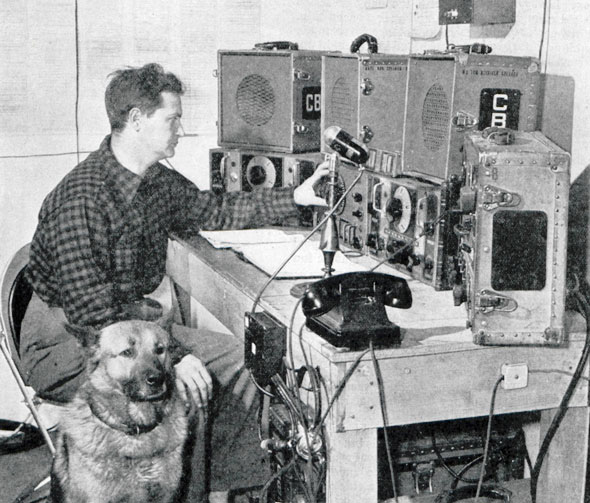
In 1940, World War II barely qualified for “world” status; much of the globe was still sitting out the European conflict. Except for Canada, and three European colonies on the northern coast of South America, the Western Hemisphere was still on the sidelines.
In an attempt to woo the unaffiliated nations to their causes, the Allied and Axis powers transmitted continual streams of propaganda. “Name-calling, word-weaseling, news-angling, special-pleading, prejudice-promoting, air-polluting, ground and lofty lying and covering-up” came pouring out of Europe, wrote Post journalist J.C. Furnas, “on radio waves in some 15 or 16 languages.”
German broadcasts in English, he reported, were pulling at the seams of America’s social fabric. The Nazis played on the sympathies of German-Americans, and anyone who hated Roosevelt or Jews. Their message was not well received.
First, relatively few Americans, German heritage or not, still had an open mind regarding the Nazis after what had happened in Poland.
Second was a literal problem with reception. Broadcasts from Berlin had to travel about 4,000 miles just to reach the American shore. The signal was often disrupted by solar flares or North Atlantic weather. Given the difficulty of getting a clear signal from Germany, Furnas wrote, many Americans found it easier, and more agreeable, to listen to the Chase & Sanborn Show with Charlie McCarthy.
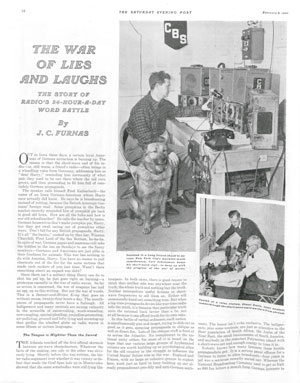
Meanwhile, South America was receiving propaganda from every major country in Europe. But the Germans, Furnas wrote, were making the greatest effort in this region. The Nazis fed them “news” that appealed to their pride and stirred their resentment: “German broadcasts mix such items as the flag being half-masted on the Reichstag, because of the death of the president of Ecuador, with forebodings about the menace of the German-Jewish immigration to Brazil. The Nazi broadcasts also disparage the United States, whenever possible.”
When not trying to recruit neutrals, the beligerants engaged in psychological warfare by radio. French and British propaganda, Furnas wrote, was relatively tame. It could afford to be, since the Allies’ cause was “already pretty well sold to the neutral world.”
Furnas characterized British broadcasting as having “dignity, suavity, homely little touches, and something Anglophobes call smugness.”
He went on to explain: “A Church of England bishop is put on the air to scold the Germans about Nazi concentration camps, evidently in the hope that a real live bishop will impress the Gestapo where massed world opinion has never yet made a dent. Since the war began, every Empire broadcast has ended on this poetic doxology: ‘And now we shall say good night. Sleep well. Wherever you may be in the colonies, this is a very good night from home.’ … You could set that to music and sing it.”
Nazi propaganda was as devious, bitter, and hysterical as you’d imagine for a political group that had risen to power by manipulating fear and resentment. The best known propagandist working for the Nazis was William Joyce. Born in America and raised in Ireland, Joyce became an enthusiastic supporter of fascism in England. In 1939, he traveled to Germany to work with the Nazi propaganda ministry. Joyce had an affected manner of speaking, which could infuriate or amuse listeners, and earned him the nickname “Lord Haw-Haw.”
Here is a snippet from one of his broadcasts, aired after the British attacked the French fleet in Algeria. It occurred shortly after the French surrendered to the Germans in June 1940. According to their treaty with the British, the French naval officers were supposed to prevent their ships from falling into the hands of the Germans. But some officers in the Algerian harbor near Oran were prepared to hand over their warships to the German navy. The British demanded they honor their alliance with England. The French officers refused, and the British navy opened fire on them, sinking a battleship, damaging several others, and killing over 1,000 French sailors. Naturally, Lord Haw-Haw made the most of the incident:
Here’s Haw-Haw again, mocking England’s attempts to protect civilians from German bombs against the coming air war:
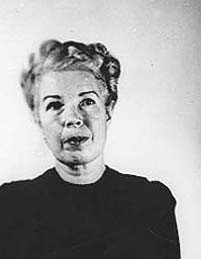
(Wikimedia Commons)
Once America entered the war, the Nazis began broadcasting defeatist propaganda using an American living in Berlin. Here is Mildred Gillars, often referred to as “Axis Sally,” explaining why she’s in Berlin instead of back home at “the little sewing bees” with the girls. Note that, although she was presenting herself as “100 percent American,” she spoke with a strong British accent. She also refers to soldiers in South Africa, when she means American soldiers in the north Africa campaign.
The Germans often aired recordings of Charlie and His Orchestra. Vocalist Karl “Charlie” Schwedler led the band, singing swing tunes laden with Nazi propaganda. Karl’s accent and the leaden satire of the Nazis is fascinating for a short time, before they become obnoxious.
I’ll leave you with the conclusion of Lord Haw-Haw’s final broadcast:
“You have heard something about the battle of Berlin,” says Joyce in this last transmission. “You know there’s a tremendous, world-shattering conflict is being waged. I would only say that the men who have died in the battle of Berlin have given their lives to show that, whatever else may happen, Germany will live.
“No coercion, no oppression, no measures of tyranny today that any foreign foe could introduce, will shatter Germany. Germany will live because the people of Germany have in them the secret of life. [unintelligible] And therefore I say to you, in these last words, you may not hear from me again for a few months. I say, “Es lebe Deutschland.” [Long live Germany.] Heil Hitler, and farewell.”
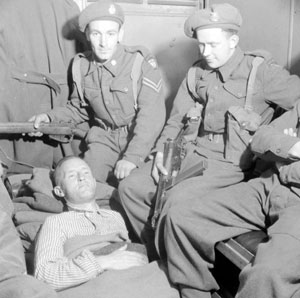
(Wikimedia Commons)
The date was some time in May of 1945, when things were not going so well for the Nazis. The Russians were closing in on Berlin and the Third Reich’s “thousand-year reign” wouldn’t last to the end of the month. So we bring you Joyce, obviously drunk, throwing his final threats and prophecies into the air.
Within a few weeks, he was captured. By January of the following year, he was executed in Great Britain for treason.
Did any of the propaganda make a difference? Judging by contemporary accounts, British broadcasts didn’t do a better job of disenchanting Germans with their government than the Nazis, themselves, did. And Nazi propaganda was treated by the British for the mass of deception they knew it to be. Lord Haw-Haw might have annoyed some people, but he was cheap entertainment for most listeners.
The Germans’ broadcasts seemed to have made no significant impact in the U.S. They were no more successful in Latin America. The U.S. made a successful effort in World War II to build better alliances with its southern neighbors that, except for the European colonial countries, every country in South and Central America had joined the Allies.
Step into 1940 with a peek at these pages from the February 3, 1940 issue of The Saturday Evening Post, 75 years ago:
A Look Inside Germany’s First Conquest
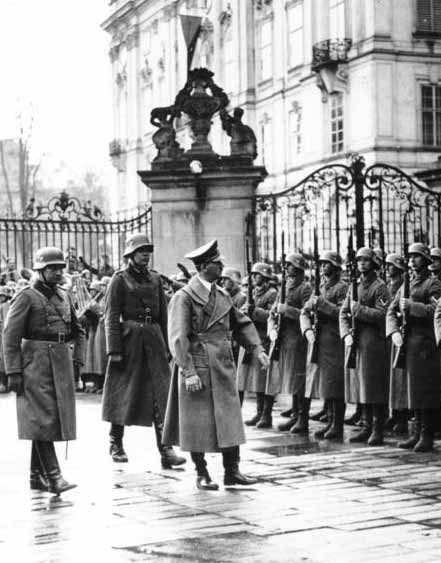
courtesy Wikimedia Commons
By coincidence, a Post article about Czechoslovakia, the first nation conquered by Hitler, appeared just as he was grabbing up his second.
“Nazi Germany’s First Colony” appeared in the Post on August 26, 1939, the day Hitler had originally planned to invade Poland (Read full article here). But his plans were pushed back, and the issue was still on newsstands when Hitler’s armies crossed the border into Poland on September 1. The ensuing blitzkrieg, which brutally crushed all Polish resistance, had little in common with the swift, bloodless conquest of Czechoslovakia.
The Czech republic had already been reduced when Great Britain and France allowed Hitler to occupy its borderlands in 1938. The next year, he returned to grab the remaining provinces of Bohemia and Moravia through threats of invasion. United Press reporter Edward W. Beattie Jr., who was in Czechoslovakia at the time, described the curious manner of the German invasion.
After bribing a taxi driver to take him toward Germany’s advancing forces, Beattie was startled when German scouts suddenly appeared, moving rapidly, coming down the road toward him: “When we met them head-on, the driver tried frantically to turn. It was too late. The unit began passing us. The officer in command leaned out over the side of [his] scout car. I thought he was going to ask for identification but all he said was: ‘From now on in this country, you drive on the right-hand side of the road.’ The occupation was as easy as that” (collected in They Were There: The Story of World War II, edited by Curt Riess, Garden City Publishing, 1945).
Step into 1939 with a peek at these pages from this week’s Post, 75 years ago:
There was no violence, no popular uprising, no guerilla warfare. The Germans simply took up residence in the capital city, Prague, and began appropriating what they wanted. Resistance was reduced to futile gestures, like the one Beattie recounted when he and other foreign correspondents had visited a nightclub. Taking advantage of their journalistic immunity, the reporters ordered the band to play “It’s a Long Way to Tipperary,” “Over There,” and other Allied songs from the First World War. In a scene reminiscent of the movie Casablanca, the songs made “a couple of dozen German officers at other tables [get] more and more restless.
“Finally two officers a short distance away pounded for silence,” Beattie wrote, “and one of them came over and demanded that we stop ‘insulting the German army.’ Later in the evening, when everyone was drinking pretty heavily, he drew me to one side and said, ‘You don’t think we like this sort of thing too much, do you? For God’s sake, let us try to make this occupation as decent as possible.’ (The army’s part in the occupation was decent in every way. Of course, the Gestapo and the S.S. arrived later.)”
Beattie’s observation was echoed by the Post’s foreign correspondent Demaree Bess: “Greater Germany has planted her first colony in the heart of Europe. Bohemia and Moravia … have become as much of a colony as any island in the South Seas. The Czechs have assumed the inferior status of natives. … [They] do most of the work and the Germans pull all the wires.” It was the Germans’ goal to turn the republic into an efficient workhouse and profit center for the German Reich.
In these early days, they were careful not to make their exploitation too obvious. As Bess wrote, the Germans still hoped to win the cooperation of Czech workers and industrialists. At least that was the intent of the new government the Germans set up in Prague. Their biggest obstacle, it turned out, was other Germans — the Gestapo, the S.S., and officials of the Nazi party.
Nazi officials descended on Prague with the sole purpose of enriching themselves. They were soon disrupting Czech manufacturing by raising production quotas while limiting managers’ profits. The Nazis were further disrupting the economy by ruthlessly exploiting the Jews.
“When the Germans entered Prague without warning last March, they made it clear at once that life would become intolerable for Jews,” wrote Bess. “Thousands therefore went to the German secret police to apply for permission to leave the country. They were told their applications could not be filed until they had made ‘satisfactory arrangements’ with a Nazi-controlled bank, which demanded full powers of attorney over their property.”
The full savagery of Nazi domination was still in the future. But already, under German rule, life was becoming miserable for the Czechs. Consequently, Bess reported, “I know of only one European country today whose people, in very large numbers, actually desire a general European war. That country is the German protectorate of Bohemia and Moravia. The Czechs say they have discovered that some things are worse than modern war.”
They were about to find out that modern war could be much, much worse.
Listen to President Roosevelt’s August 28, 1939 address to the Herald-Tribune Forum. In talking about the need for peace, he is already distancing himself from the old policy of peace by appeasing Hitler.
Listen to a radio speech on the BBC given on August 27, 1939 by Jan Masaryk, the former head of the Czech nation. He had seen his country betrayed by his allies, Great Britain and France, who allowed Hitler to seize first the border regions of Czechoslovakia, then the entire nation, rather than go to war with Germany.
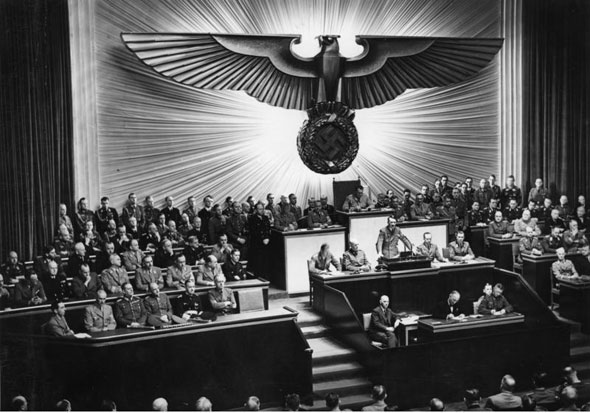
Listen as Adolf Hitler justifies his invasion of Poland to an ecstatic Reichstag.
Meanwhile, as you’ll hear, Great Britain and France are hurriedly summoning their governments to respond to Germany’s aggression.
